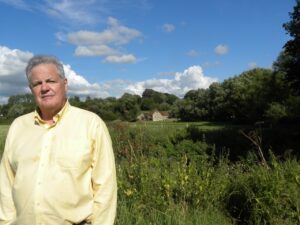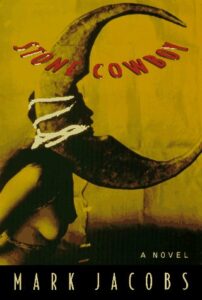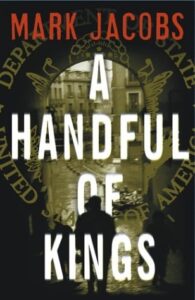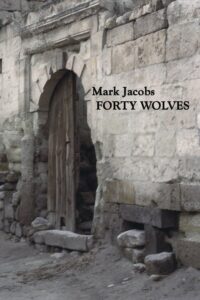
A Conversation with Mark Jacobs
Lowestoft Chronicle interview by Nicholas Litchfield (September 2022)

In spite of a lengthy government career requiring extensive travel and prolonged stays overseas, ever since the 1980s, Mark Jacobs has managed to forge a successful dual occupation as a writer of fiction. His enviable body of work includes critically-acclaimed novels and story collections lauded by illustrious authors and editors like Robert Olen Butler and C. Michael Curtis. For decades, his stories have appeared regularly in dozens of commercial and literary magazines, sometimes featured in leading newspapers like The Washington Post and The New York Times.
In this exclusive interview with Lowestoft Chronicle, Jacobs discusses his publication history, from significant mentors and literary influences to early writing accomplishments and the media frenzy that accompanied one of his short stories.
Lowestoft Chronicle (LC): Over a span of 40+ years, you’ve had well over 180 stories published in literary journals and commercial magazines. Much of your work appears in prestigious venues such as The Hudson Review, The Atlantic,Alaska Quarterly Review, The Iowa Review, The Kenyon Review, The Idaho Review, Southwest Review, and The Southern Review. Your stories continue to appear in abundance, affirming your view that writer’s block is “a literary conceit.” But when did your desire to be a writer actually begin? Did storytelling always come naturally and fluidly? Is that desire to tell a story and see it appear in a periodical the same as it was in, say, the 1980s?
Mark Jacobs (MJ): I wanted to be a writer from as far back as I can remember. When I was a kid of ten or thereabouts, I went into the kitchen in the apartment on East Falls Street in Niagara Falls, where my father was stirring a pot of spaghetti sauce, and told him that was what I wanted to do. He told me a writer needed three things. If I could remember those three things today, I’d be farther along than I am.
In our junior high school, once a year, we had something called ‘Career Day.’ It consisted, for the most part, of going to filing cabinets in the back of the classroom and reading pamphlets available there on various jobs one could hope to get. I read the pamphlets for diplomats and for a writer. I saw then no contradiction between the two vocations and saw none later when I was doing both jobs at the same time.
LC: I read that your first story, “Spring Cleaning,” a tale told from the perspective of an American missionary nun in Peru, appeared in the college literary magazine Webster Review (now defunct) in 1980, and but for more enthusiastic effort in pursuing journals, you might have placed more. What inspired you to write that story and seek a literary market for it?
MJ: I wrote “Spring Cleaning” just after returning from two years in Paraguay as a Peace Corps volunteer. I was at Drew University in a doctoral program. The English department at Drew invited the novelist Mary Lee Settle to come to campus and arranged to have her read, ahead of time, the draft of a novel I was working on. When I went into the office they assigned her to talk it over, the first thing she said was, “You’re a writer. You know that, don’t you? I can see it in your eyes.”
Settle set up a meeting for me with an editor in New York. The editor was affable and interested but did not buy my book. She told me to get myself a box of manila envelopes and start sending out my stories. I did. I think I found the Webster Review in one of those writer’s guides that used to come out annually. I sent “Spring Cleaning” to them and was blown away to get their acceptance letter back in the mail. I remember opening the envelope and reading it in a kind of stupor. The pleasure of seeing a story in print, either online or on paper, never goes away for me. It’s a way of saying goodbye.
But the most useful advice that Mary Lee Settle gave me was to be arrogant. She knew I was in for heart-crushing rejection. A writer needed a certain amount of arrogance to get through the ordeal. None of the people who were going to tell me ‘no,’ she said, could do what I was doing, and don’t forget it. I stand by that advice. Mix your arrogance with some stubbornness, shake well, and put it somewhere you won’t lose it. You’re going to need it.
LC: In terms of sheer volume and story placement, you are perhaps more prolific and globally read now than ever. Who were the authors who most influenced your early writing? What are some of the lessons you’ve learned about writing fiction, approaching periodicals, and finding an audience for your work? Are there magazines you would have liked to have been part of but, for whatever reason, never placed work with them? Would I be correct in thinking that “Famous People” was explicitly intended for The Saturday Evening Post, the oldest magazine in the U.S.?
MJ: Three writers shaped my sense of what fiction was or could be, early on: Thomas Hardy, Joseph Conrad, and Graham Greene. I read them uncritically. I was not trying to learn anything specific from them, really, or to figure out how to write, and probably not to extract anything of practical value from their books. I read them, rather, for the sheer pleasure of the story, along with the sense of a world opening up that I had not been able, until I opened the book, to imagine. I read in the possibly naïve faith that they were translating reality, getting at what mattered. I was hungry.
As for lessons learned, I don’t know for sure that I have learned any. When I sit down in the morning to write, I often have the sense that I am starting all over again. Nothing matters, in the moment, except the next sentence. (The unexpectedness, the unpredictability of certain writers’ next sentences, such as Kafka’s, is a source of joy.) The drive to get that proximate sentence right is all-consuming. That said, it seems to me that you have to be ruthless with your own stuff. Cast a deeply critical eye. Frequently. Throw things away: whole stories, a whole novel if you have to. Expand the boundaries of your natural affinities when it comes to what you read. Turn off your phone; forget you have one. Close your email. Write in the space and the time your circumstances give you; I wrote A Handful of Kings by hand, on a commuter train, in hard-backed notebooks. In fact, I still write mostly by hand. Transferring a day’s work to the computer amounts to the first edit.
Mary Lee Settle gave me one more piece of advice. Find one or at most two people to read your stuff, she said, and tune out everybody else. That notion runs somewhat counter to the way that many writers do it, sharing what they are working on in groups of other people who care about writing or are themselves writers. That seemed to work for them but was never going to be right for me. Of course, I was exceptionally fortunate to have as mentor Robert Ready, whom I would describe as one of America’s finest readers. He has worked with numerous writers through the years. There is an imbalance inherent in the relationship between a writer and her primary or first reader. It’s exploitative. You ask a lot of that person, and the next time you finish something, there you are again knocking at his door. There may be nothing you can do to change that, but it’s good to be aware, at a minimum, of what it requires of that person to give you his best take on your work, time and again.
“Famous People” was not written with The Saturday Evening Post in mind. In fact, it was first published in a literary magazine, the Delmarva Review. The Post editor reached out to me and asked to republish it. It’s a comic story. I take a deep delight in writing stuff that is, one hopes, funny. When the Post republished the story, I immediately sat down and wrote a follow-up called “Restless People.” I’m particularly keen on a comic story forthcoming in The Hudson Reviewcalled “Stiff,” which has to do with an illegal effort to dispose of a dead body.
When it comes to tailoring a story to a specific magazine or a specific editor, I have had absolutely no luck. I’ve tried, a handful of times. On no occasion was the story or novel I produced taken by the intended target. So I pretty much quit trying.
The question has to do with the one you asked about finding an audience. I can’t generalize. Other writers probably have the knack for identifying and pleasing a specifically defined group of readers. Not in my skill set. In fact, I have to go at it in the opposite way. Every story or novel I write establishes its own demands. It wants to be about something, to be something, though perhaps the ‘something’ is resistant to paraphrase. Just as importantly, it has its own inner logic, which has to be teased out. Part of this is connected with the conventional things one takes into account: plot and pacing and characterization. But it’s more than that. I continue to be convinced that a story has a kind of sui generis integrity, without which it will flop. Often it hides or otherwise eludes you. Sometimes you find it, sometimes you don’t. When you don’t, the story careens off into permanent irrelevance.
For the record, I’d still like to place a story in The New Yorker. To date, no dice.
LC: Of all your publishing credits, Playboy, in particular, catches the eye. Did you make a conscious effort to appear in that magazine? Was “The Bull You See, The Bull You Don’t” written with Playboy in mind?
MJ: No, I wasn’t thinking at all about Playboy. The story idea came to me while I was at a bullfight at Las Ventas in Madrid. (I went with a couple of other Americans who were curious, but they wound up being turned off by the violence involved, no matter how stylish the killing of the bull was meant to be and, in fact, was.) I had lived and worked in Spain previously and went back as part of a State Department team inspecting the American mission there. Certain places seem to goad me into stories; Madrid is one of them. Paraguay and Turkey exercise the same power over me.
LC: As a longtime reader of Kinky Friedman’s novels, I was intrigued to come across his glowing recommendation of your books: “if John le Carré were an American, his name would be Mark Jacobs.” Other luminaries like Pulitzer Prize winner Robert Olen Butler described you as one of the most exciting new writers he’s read, comparing your talents to that of Graham Greene. How does it feel to hear these impressive endorsements? In the course of your travels, literary relationships, and work with the Peace Corps, did you ever meet Friedman or Olen Butler?
MJ: I never met Kinky Friedman, unfortunately. I did meet Robert Olen Butler. This, too, was in Madrid. He was riding high, having won the Pulitzer for a fine collection of short stories, A Good Scent from a Strange Mountain. He was generous and enthusiastic, and I’m still grateful for his support. I’ve run into a handful of well-known writers at different times and in different places, under different circumstances. Bob Butler stands out for his magnanimity. No point naming those who were less than that.
I met the great American poet Robert Creeley in Izmir, Turkey, when he went there on an embassy-sponsored speaking tour. One of the finest nights of my life happened with him in that city. Izmir is on the Aegean. We sat drinking Turkishrakı, until reaching satiety, at a café on the promenade that runs along the Bay. The weather was mild, the night breeze was beneficent. When the time came, I walked him back to his hotel room. On the way, he stopped next to a statue of Kemal Atatürk, took my arm, held a finger in the air, and pronounced in an oracular fashion, “This.” Yep. It was this all right, around us everywhere. We were practically swimming in it.
Bob Creeley remained a good friend, bucking me up when my writerly spirits were low. At my request, he came to Asunción, Paraguay, to headline a conference on American studies. I was driving in Fairfax, Virginia, in 2005 when I heard on the radio that Robert Creeley had died. I pulled over to the side of the road and cried.
LC: Your work as a Peace Corps volunteer and employment with the State Department allowed you to experience Turkey, Bolivia, Paraguay, Honduras, and Spain. Obviously, these cultural experiences have enriched your writing. Did your work take you to other continents? Were there parts of the world you would rather have been stationed? I read in a 2016 article that you spend five months a year abroad inspecting American embassies. Did you continue to work overseas until the COVID-19 pandemic?
MJ: I’ve worked in Africa, the Middle East, and a number of countries in Asia as well. I tend to be drawn to places that are not tourist havens. I particularly liked Cambodia, Tajikistan, and Mali. I no longer work for the State Department’s Office of Inspector General, which took me to embassies around the world. I stopped doing that about the time that Covid hit.
LC: The nonfiction project you proposed, Writers on America, proved universally popular. Were you involved in deciding which writers took part?
MJ: The idea for Writers on America came to me in the wake of the September 11th attacks. It seemed like all anybody was talking about had to do, in one way or another, with terrorism. I thought there were other things to say, other things to hear, other ways of engaging with foreign publics. I proposed the project at the State Department, and a publications team headed by a genuinely literate man, George Clack, took it from there. I had no say in the choice of writers from whom an essay was solicited about what it meant to be an American. The writers George contacted were responsive and enthusiastic and represented a worthy cross-section of American letters.
LC: You once said that “all writing is a kind of failure. The story you write displaces the stories you did not write from the universe of possibilities. The question one keeps asking is this: in the story I chose to write, did I get it right?” Are there previously published stories you find yourself drawn back to, looking over them with a desire to rework or recreate from a new perspective?
MJ: Once a story is published, I take my leave from it. I seldom think of it again. A few times, many years after a story is in print, I’ve picked one up and read it again. Each time I do, I am surprised by how much I have forgotten. I can’t remember where the story is going. It’s like the old dementia joke: you keep meeting the nicest people.

LC: Would you mind elucidating the backstory to the novel Stone Cowboy? I believe it started out as a short story for The Atlantic (“Stone Cowboy on the High Plains”), later morphing into a novel. The aftermath of that short story feels like a strange and sensational fictional movie: protest marches, boycotts, political cartoons, and broad media condemnation, including columns in The Los Angeles Times and The Washington Post. Were you really burned in effigy?
MJ: The story began in Europe a long time ago, when I traveled for a month with a guy who was the prototype stone cowboy. (His name, in fact, was Roger, and he told me a story that stuck with me about standing on the beach in Spain, holding a harmonica up to the wind and hearing it play.) The controversy began when the Council on Hemispheric Affairs asserted that I identified with the anti-Bolivian sentiments of Roger, the stone cowboy in the story. There was a short-lived media frenzy, mostly in Latin America, but the contretemps was echoed in some of the American media as well. I found it painful to be condemned as I was, but one grits his teeth and keeps going. I was gone from La Paz by the time the story appeared and the issue blew up, but I was told that yes, I was burned in effigy. Quite possibly, no one took pictures.
Shortly thereafter, a book editor in New York suggested I make the Atlantic Monthly story into a novel. It went through several versions. The writing was complicated by the demands of my job. I was in the U.S. embassy in Asunción, doing my own public affairs and spokesman job, acting for long stretches as the ambassador’s deputy, and presiding over a school board that was melting down into dysfunction due mostly to personality conflicts. My time to write was severely restricted. I finished the novel by the time I transferred to the Madrid embassy, but by then, the New York editor who made the original suggestion had disappeared from my horizon.
LC: Conversely, in terms of critical reception for the novel, you couldn’t have asked for better. Kirkus Reviews described it as “an impressive debut from a writer with a generous imagination and a daring, if deeply weird, sense of character and fate.” Publishers Weekly applauded the “lucid, sinewy prose” and your “intimate knowledge of the Bolivian people and landscape,” and Library Journal called it “essential reading for anyone attempting to understand the human side of our drug policies.” Did the controversy surrounding your short story make you want to distance yourself from it? Did unanimous support for your novel vindicate the writing?
MJ: I never had the slightest inclination to distance myself from the story. The stubbornness I mentioned above kicked in. I knew there was nothing offensive in “Stone Cowboy on the High Plains.” The controversy over Rushdie’s The Satanic Verses was still fresh. I was heartened by an op-ed in one of the La Paz newspapers entitled “The Satanic Verses of Mark Jacobs,” which not only defended my intentions but made a strong case for the necessary independence of fiction and fiction writers.
As for vindication, it involves an emotion that is a luxury I can’t afford if I’m going to get the work done.

LC: I’ve long been an admirer of Soho Press, so I’m curious about your experiences with them. How did you get involved with the publisher? Did the experience differ greatly regarding your subsequent novel, A Handful of Kings, published with Simon & Schuster?
MJ: Juris Jurjevics was the editor-in-chief of Soho at the time. He liked the novel but thought the ending was weak. I was in Madrid. I stayed up most of one night thinking about his criticism, then quickly rewrote the ending in a way that seemed consonant with his recommendations but also true to my sense of Roger. I was pleased that Juris also published a book of short stories, The Liberation of Little Heaven, now out of print.

LC: It’s been more than ten years since the publication of your last novel, Forty Wolves. Are you working on a new novel, pursuing a suitable publisher for completed projects, or focusing on short story collections?
MJ: I have stories, I have novels. We’ll see what happens.
LC: Concerning the impetus for a story, you once said they develop in different ways. “Sometimes it starts with a character. Other times it’s a situation, or the flavor of a memory. Once in a while, it’s just a phrase.” Your latest story, “After the Meltdown, On the Hunt,” is an interesting variation on the big game hunt tales and the various Connell derivatives. What motivated you to write this story?
I’ve always been drawn to dystopic fiction, dystopic movies. 1984 and Brave New World are perfect complementary halves of a nightmarish future. Whether humankind will be undone by coercion or diversion, or some canny combination of the two, is a question worth posing. “After the Meltdown” came to me as a way of thinking about how people allow themselves to become accustomed to brutality, gradually and insensibly, until it becomes the gruesome new normal. The story’s narrator is not a highly principled individual. His rejection of the hunt and the hunters takes time—the length of the story—to come to fruition.
About the Author
Formerly a Peace Corps volunteer and a foreign service officer, Mark Jacobs writes stories and novels. Many but not all take place in the countries in which he has lived, worked, and traveled. Some take place in rural south-central Virginia in a fictional Broadhope County, unofficially designated a protectorate of the imagination.
About the Interviewer
Nicholas Litchfield is the founding editor of Lowestoft Chronicle. He has worked in various countries as a journalist, librarian, and media researcher and resides in western New York. Formerly a book critic for the Lancashire Post, syndicated to twenty-five newspapers across the U.K., he now writes for Publishers Weekly and regularly contributes to the Colorado Review. He can be found at nicholaslitchfield.com
